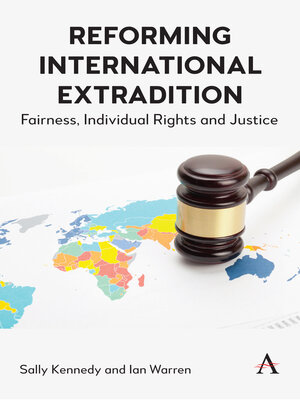Reforming International Extradition
ebook ∣ Fairness, Individual Rights and Justice · Anthem Studies in Law Reform
By Sally Kennedy

Sign up to save your library
With an OverDrive account, you can save your favorite libraries for at-a-glance information about availability. Find out more about OverDrive accounts.
Find this title in Libby, the library reading app by OverDrive.



Search for a digital library with this title
Title found at these libraries:
| Library Name | Distance |
|---|---|
| Loading... |
This book uses several case studies to demonstrate current problems with international extradition. These include political issues, time delays, jurisdictional problems, and conflict between surrender and the human rights of extraditees. The normative assumptions underpinning extradition ensure these procedures are more likely to prioritise international comity between nation states, rather than individual human rights protections. This creates a system with limited judicial relief for extraditees that require extensive proof of high human rights thresholds, as well as a prominent rule of non-inquiry, restrictive evidence regulations, and deference to the executive. The book argues that a defendant-centred approach to extradition reform is needed that prioritises a right to fairness as a core value for promoting global justice. This includes considering changes to enable greater post-extradition monitoring of extradited people and broadening rules for extraditees to submit evidence to support a claim against surrender. New and more viable extradition alternatives also involve transferring evidence to shift the trial to the location where most of the offending activity occurred and sentencing in the extraditee's home jurisdiction. These proposals aim to counter the current unequal levels of authority that favour the power of both the requesting and requested state over the rights of the individual.
|This book explores possible reforms to improve the operation of the international extradition process. The book commences by outlining why international extradition requires reform based on its current operation. Whilst extradition is important for enabling transnational criminal justice and policing cooperation, its implementation is fraught with political problems, time delays, and issues that result from outdated legal and jurisdictional geographies. This is because extradition is enforced at the domestic level, rather than through genuine transnational legal processes. Domestic legal and political issues can create conflict between the nations involved and compromise the human rights of individual extraditees.
This book discusses these issues alongside the significance of globalisation, the dominance of territorial sovereignty in determining criminal jurisdiction, and the delicate balance between state rights, international cooperation, and individual protections, which are associated with extradition processes. This range of issues demonstrates how the normative assumptions behind extradition ensure these processes are likely to prioritise the interests of comity between nation states, rather than the rights of individuals. The limited availability of judicial relief for extraditees reflects how state rights are prioritised, with the law implementing high thresholds needed to establish proof human rights violations will occur if a person is surrendered. Further technical issues, such as the rule of non-inquiry, restrictive evidence options, and judicial deference to the executive, also compromise fairness in extradition cases. This combination of issues are the driving force behind the book's argument regarding the need for global reform of the extradition process.
The book uses several case studies to demonstrate these key problems. These include the high-profile cases involving Julian Assange and Kim Dotcom, as well as lesser-known cases involving Hassan Diab, Daniel Snedden, Dorin Savu, and Elias Perez. These examples span multiple jurisdictions and highlight the common problem that judicial decision-making prioritises international comity by favouring surrender of the extraditee over individual elements, such as mental health and a high risk of...







